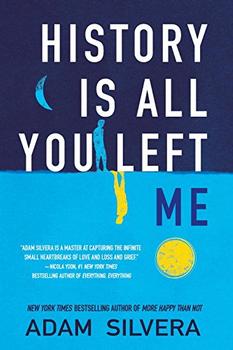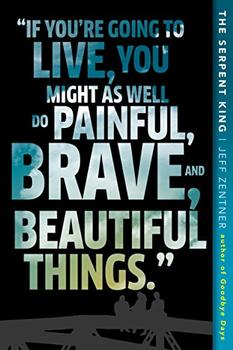Summary | Excerpt | Reviews | Beyond the book | Read-Alikes | Genres & Themes | Author Bio

Guilt can be a heavy burden for anyone to manage, but it's especially difficult for teenagers. Jeff Zentner's YA novel, Goodbye Days, explores this consuming emotion in an authentic and, ultimately, affecting way.
Carver Briggs, Zentner's protagonist in the Nashville-set novel is a seventeen-year-old high school student. He's intelligent and artistic; he's also kind and thoughtful. All things considered, Carver is an ideal teenager. Then, the unthinkable happens. Carver sends a mistimed text to his friend Mars, who is driving their other two friends Eli and Blake. Mars attempts to reply while he's driving and crashes the vehicle. Mars, Eli, and Blake die in the horrible accident.
Most of the Zentner's story follows the days immediately after the wreck, as Carver struggles to deal with the loss of his friends. He speaks bluntly about the pain he feels: "I want to live unburdened again." Carver explains that he can't even escape his intense feelings of guilt in his dreams:
I awake with a wild gasp, my pulse galloping. My sheets are drenched with sweat, my face tight with the salt of dream tears. I used to love crying in dreams for some reason – the release of it, maybe, crying in that savage way that you won't let yourself do when you're conscious. Waking up with your eyes wet like puddles after a midnight thunderstorm. That was when I wasn't crying for anything in particular. I guess guilt doesn't sleep. It only eats.
Carver's guilt reaches a point where he requires help, which he gets from Dr. Mendez, a kind and interesting psychologist. The sessions with Dr. Mendez help Carver temporarily, but then Carver relapses and begins having panic attacks after facing constant accusations that he might be held "criminally negligent" for sending the text.
In the most moving section of the novel, Blake's grandmother approaches Carver to participate in a "Goodbye Day." She describes this day as being a time for Carver to pretend to be Blake so she can formally say goodbye to her beloved grandson. Carver hesitates, but he eventually agrees. Witnessing their interaction is simultaneously heartbreaking and heartwarming. Zentner is at his very best when he dives into these kinds of emotional connections. They transcend reader expectation and sparkle with wisdom and truth.
While Goodbye Days has many stunning moments, it also struggles to keep its momentum. At times, Carver meditates on his friends' deaths, and his voice sounds too adult – perhaps too wise. For example, he thinks about going to jail often, and he worries that schools and employers will find out about his mistake. These thoughts aren't necessarily unrealistic, but their timing is. This is a kid who still thinks that his friends are alive "for about five seconds each day." He's too broken to face the future.
Zentner's latest novel will appeal to readers of Adam Silvera and David Arnold. All three authors write with a realism and penchant-for-diversity that echoes two of the YA genre's biggest names: John Green and Rainbow Rowell. Mature teens, especially those who might have experienced the loss of a friend, should seek out this novel.
Readers who fell in love with Zentner's masterful debut, The Serpent King, will also find plenty to enjoy here. Zentner gives us the same southern vibrancy, and the characters are just as easy to root for. Goodbye Days isn't as essential as Zentner's first novel, but there's plenty to appreciate in this moving meditation on teenage guilt.
![]() This review was originally published in The BookBrowse Review in April 2017, and has been updated for the
March 2018 edition.
Click here to go to this issue.
This review was originally published in The BookBrowse Review in April 2017, and has been updated for the
March 2018 edition.
Click here to go to this issue.

If you liked Goodbye Days, try these:

by Adam Silvera
Published 2018
From the New York Times bestselling author of More Happy Than Not comes an explosive examination of grief, mental illness, and the devastating consequences of refusing to let go of the past.

by Jeff Zentner
Published 2017
A touching debut chronicles the coming-of-age of three high school seniors, misfits and best friends in a sepia-toned portrait of small-town life.
What really knocks me out is a book that, when you're all done reading, you wish the author that wrote it was a ...
Click Here to find out who said this, as well as discovering other famous literary quotes!
Your guide toexceptional books
BookBrowse seeks out and recommends the best in contemporary fiction and nonfiction—books that not only engage and entertain but also deepen our understanding of ourselves and the world around us.